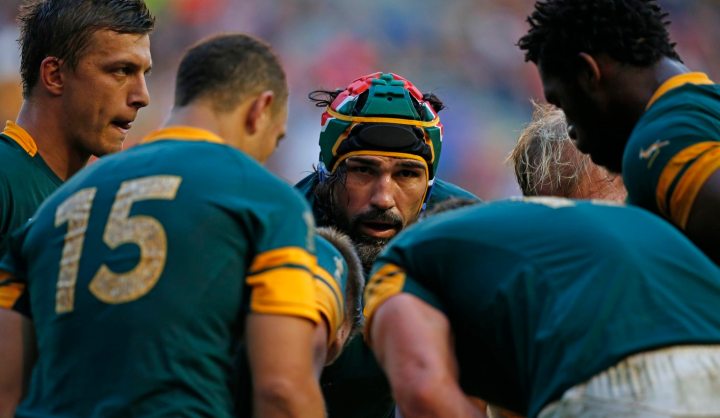South Africa, Sport
Rugby World Cup 2015: Data points to the Boks’ real problem

There seems to be a major shift in the schools that produce Springboks, from a greater number of rural Afrikaans and 'ordinary' state schools, to elite cosmopolitan ones. While the team is slowly becoming more multi-racial, it is becoming elitist in another way. Much like the rest of South African society. By WESSEL VAN RENSBURG.
I had a theory that South African rugby is emulating the rest of South African society, concentrating more and more resources on an ever-shrinking elite. After the loss to Japan I thought it high time to do a bit of digging and crunched some numbers.
Let me hasten to add though that what follows should not detract from Japan, who played a blinder in the most enthralling match of the tournament thus far. I am talking about long-term trends, a slow decline in the win ratio of the Boks.
Here is what I did. I took four starting 15s for the Boks in different periods of time and had a look at which schools they attended. Then I looked up how many Boks each of these schools produced. My hypothesis was that there would be a greater number of schools in the past producing Boks, and probably also different kinds of schools.
The teams I looked at were:
-
The 1970 Boks who won three matches against the All Blacks: I picked the team from the first match.
-
The 1995 World Cup winning team: I picked the team from their first match.
-
The 2007 World Cup winning team: Again I picked the team from their first match.
-
And the team that started against Japan on Saturday.
So as you can see from the graph, below, the 1970 team had five players who came from schools that were totally one-offs, and never produced Boks before or after again:

-
Tiny Neethling (Rawsonville)
-
Piston van Wyk (John Orr, a ‘technical’ school preparing students for a life in the trades).
-
Jan Ellis (Wennie du Plessis)
-
Albie Bates (Milner)
-
Syd Nomis (Damelin College)
Compare that to the current team on the other hand that had only one school that only ever produced one Bok. That was Lwazi Mvovo who went to Maria Louw. This team did, however, have seven players that came from very established elite rugby schools, which I’d like to call Bok factories:
-
Bismarck du Plessis (Grey)
-
Jannie du Plessis (Grey)
-
Francious Louw (Bishops)
-
Schalk Burger (Paarl Gimnasium)
-
Ruan Pienaar (Grey)
-
Jean de Villiers (Paarl Gimnasium)
-
Jesse Kriel (Maritzburg College)
Three other players in Saturday’s team come from moderately to very expensive private schools that are not traditionally known for being Bok factories, but have recently started to produce more than one:
-
Tendai Mtawarira (Peterhouse)
-
Patrick Lambie (Michaelhouse)
-
Bryan Habana (King Edward VII)
Looking at the trends from the four teams, there seems to be a slow slide to more elite schools, as less one-off wonders and schools that produced just two Boks show up in the data. In 2015, however, this trend seems to have accelerated.
What kind of players might never be cultivated in the future? Besides Jan Ellis and Syd Nomis, legends that did not go to elite schools or Bok factories in years past include arguably our greatest ever player – Frik du Preez (Rustenburg). Also also Os du Randt (Adelaide), Joost van der Westhuizen (FH Odendaal), Victor Matfield (Pietersburg), Bakkies Botha (Vereeninging), and Francois Pienaar (Patriot Witbank).
One upside I did expect the data to show is that these elite or Bok factory schools are producing more black players. That’s not clear from the four teams I picked. It is true for Habana and Mtawarira, but Zane Kirchner went to PW Botha, JP Pietersen to Generaal Hertzog and Movovo’s is not a private school either.
A further more comprehensive look at the data is needed but here are some more hypothesis that should be tested. There does seems to be a major shift in the schools that produce Boks, from a greater number of rural Afrikaans and ‘ordinary’ state schools, to elite cosmopolitan ones. While the team is slowly becoming more multi-racial it is becoming elitist in another way. Much like the rest of South African society.
While it is easy to imagine that if there are fewer schools producing Boks, the quality of the team will suffer, I have a further hypothesis. Antonio Gramsci talks of the importance of a country having a national popular culture, as opposed to a split between an elite and a people’s culture, for all kinds of success.
The challenge for the Boks to keep performing as they used to, is to transplant Afrikaner Nationalism’s near religious devotion to rugby, and its broad inter-Afrikaner classlessness, with something similar for the whole of the country. Looking at the data of who is attending what schools, it is no longer clear that Afrikaner classlessness still exists even in the Afrikaner community itself.
England and Ireland, where posh schools used to produce a vast amount of players in the national teams are a good example of where the opposite is starting to happen. More and more ordinary people are interested and very knowledgeable about the game – and you can see it on the field. DM
Photo: South Africa v Japan – South Africa’s Victor Matfield speaks to team mates/ (Reuters / Eddie Keogh)


















 Become an Insider
Become an Insider